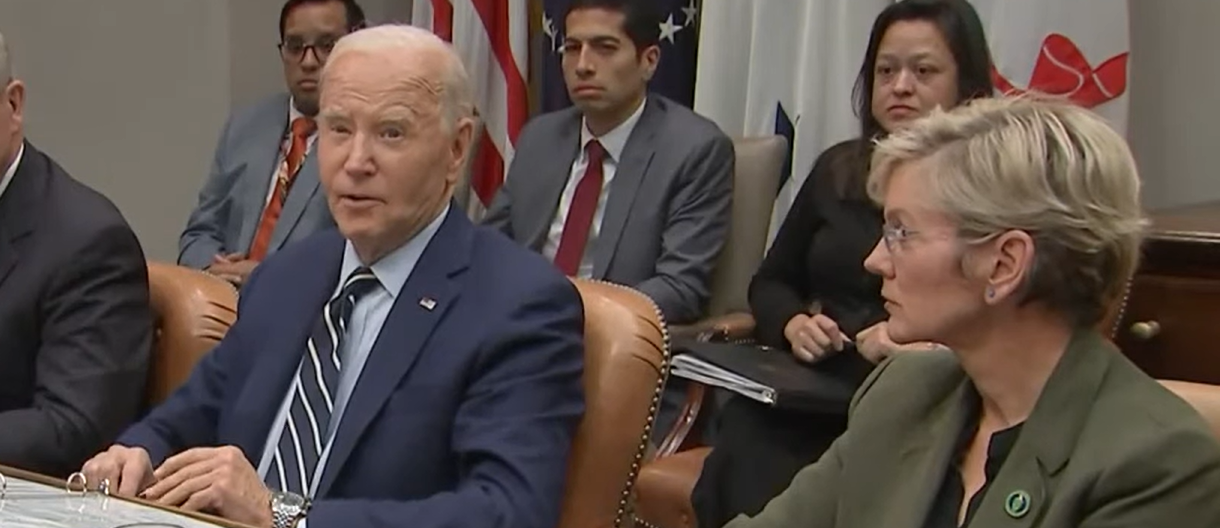Commentary: Big Tent Ideas
BONNER RUSSEL COHEN: The Heartland Is Tearing Off Biden’s Green Energy Shackles

Screen Capture/CSPAN
A green company’s yearslong effort to use the power of eminent domain to seize farmland in the Plains States was derailed after Republican South Dakota Gov. Larry Rhoden signed legislation on March 13 barring the condemnation of private property for the construction of a CO2 pipeline.
Iowa-based Summit Carbon Solutions’ $4.5 billion, 2,100-mile climate project envisaged pumping 12 million tons of carbon dioxide captured annually at Midwestern ethanol plants across five states – Nebraska, Iowa, Minnesota, South Dakota and North Dakota – via a highly-pressurized pipeline before burying it deep underground in North Dakota.
Dubbed the “CO2 pipeline,” the project is part of a larger carbon capture and storage scheme, a taxpayer-subsidized investment fad touted to help heavy industries reach the Biden administration’s goal of achieving net-zero carbon emissions by 2050. The 2022 Inflation Reduction Act (IRA) supported the technology by offering participating companies a tax credit of up to $85 per ton of CO2 emissions captured and stored.
Under pressure from Biden-era regulators to cut emissions, and eager to pocket the lucrative tax credits, oil companies, including Chevron, ExxonMobil, Baker Hughes and SLB (formerly known as Schlumberger), hopped aboard the carbon capture and storage gravy train.
But the technology remains unproven, proposed projects encounter fierce local resistance, and – not least – the political landscape no longer favors green policies. “Carbon capture and storage technology today is expensive, logistically complex, and faces controversy over its role in the energy transition and safety concerns in the communities where pipeline infrastructure would be expanded,” CNBC reported in 2024.
The proposed CO2 pipeline cannot function logistically unless it passes through South Dakota, where hostility by landowners in its path proved the project’s ultimate undoing. “South Dakota landowners feel strongly that the threat of involuntary easements for the proposed carbon dioxide pipeline infringes on their freedoms and their property rights,” Rhoden wrote in a letter to the Legislature and to the people of the Mount Rushmore State.
Even before South Dakota effectively killed the project, another CO2 pipeline proposed for the rural Midwest suffered a similar fate. Heartland Greenway was supposed to pump 15 million tons of CO2 captured annually from emissions of ethanol plants via a 1200-mile pipeline traversing five Midwest states before being deposited thousands of feet underground in North Dakota. But such was the uproar of landowners, state and local regulators, and elected officials along its path that the project’s developer, Navigator CO2, abandoned it in October 2023.
In both cases, farmers’ fears of the harm the pipeline could do to soil and crop yields, together with an aversion to losing their private property to eminent domain, proved too much even for well-financed developers to overcome.
Yet casting an even longer shadow over the future of carbon capture and storage, CO2 pipelines, and other government-backed green projects is the radically changed political climate in Washington. Under the Trump administration, the goal of net-zero emissions has given way to the pursuit of global energy dominance, spearheaded by fossil fuels and renewed focus on nuclear power.
Companies hoping to stuff themselves with the all-you-can eat green buffet of the Biden years are now finding the offerings have been scaled back. Trump paused indefinitely the approval of permits for new offshore wind projects, knowing full well it would discourage investors from putting their money into these capital-intensive projects. A similar chilling effect could be in store for the once-politically favored EV industry. The Trump administration plans to rollback Biden-era EPA tailpipe emissions regulations designed to force automakers to abandon the production of gasoline-powered cars and switch to the manufacture of EVs.
And on Capitol Hill, GOP lawmakers are considering eliminating generous tax credits (under the IRA up to $7,500) for people buying or leasing electric vehicles.
A new analysis from the Cato Institute reveals that the energy tax credits in the IRA could saddle taxpayers with a staggering $4.7 trillion bill by 2050.
“The massive cash transfer from taxpayers to private firms under the guise of environmentalism creates an overwhelming and undue burden on taxpayers who continue to pay for fiscally irresponsible federal spending,” the Cato study notes.
Accustomed to being pampered by government handouts, green enterprises are now facing the daunting prospect of having to stand on their own two feet.
Bonner Russell Cohen, Ph. D., is a senior policy analyst with the Committee for a Constructive Tomorrow (CFACT).
The views and opinions expressed in this commentary are those of the author and do not reflect the official position of the Daily Caller News Foundation.
All content created by the Daily Caller News Foundation, an independent and nonpartisan newswire service, is available without charge to any legitimate news publisher that can provide a large audience. All republished articles must include our logo, our reporter’s byline and their DCNF affiliation. For any questions about our guidelines or partnering with us, please contact [email protected].

